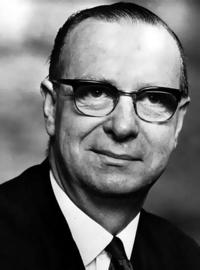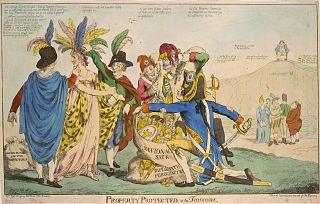
Elbridge Gerry was an American Founding Father, merchant, politician, and diplomat who served as the fifth vice president of the United States under President James Madison from 1813 until his death in 1814. He is known to be the father and namesake of the political practice of gerrymandering.
Sinn Féin is an Irish republican and democratic socialist political party active in both the Republic of Ireland and Northern Ireland.

Gerard Adams is an Irish republican politician who was the president of Sinn Féin between 13 November 1983 and 10 February 2018, and served as a Teachta Dála (TD) for Louth from 2011–2020. From 1983–1992 and from 1997–2011, he won election as a Member of Parliament (MP) of the UK Parliament for the Belfast West constituency, but followed the policy of abstentionism.

Seán MacBride was an Irish Clann na Poblachta politician who served as Minister for External Affairs from 1948 to 1951, Leader of Clann na Poblachta from 1946 to 1965 and Chief of Staff of the IRA from 1936 to 1937. He served as a Teachta Dála (TD) from 1947 to 1957.

James Gerard Collins is an Irish former Fianna Fáil politician who served as Minister for Foreign Affairs from March 1982 to December 1982 and 1989 to 1992, Minister for Justice from 1977 to 1981 and 1987 to 1989, Minister for Posts and Telegraphs from 1970 to 1973, Parliamentary Secretary to the Minister for Industry and Commerce and Parliamentary Secretary to the Minister for the Gaeltacht from 1969 to 1970. He was a Member of the European Parliament (MEP) for the Munster constituency from 1994 to 2004. He served as a Teachta Dála (TD) for the Limerick West constituency from 1967 to 1997.

Gerard Fitt, Baron Fitt, was a politician from Belfast, Northern Ireland. He was a founder and the first leader of the Social Democratic and Labour Party (SDLP), a social democratic and Irish nationalist party.

The XYZ Affair was a political and diplomatic episode in 1797 and 1798, early in the presidency of John Adams, involving a confrontation between the United States and Republican France that led to the Quasi-War. The name derives from the substitution of the letters X, Y, and Z for the names of French diplomats Jean-Conrad Hottinguer (X), Pierre Bellamy (Y), and Lucien Hauteval (Z) in documents released by the Adams administration.
Tiocfaidh ár lá is an Irish language sentence which translates as "our day will come". It is a slogan of Irish republicanism. "Our day" is the date hoped for by Irish nationalists on which a united Ireland is achieved. The slogan was coined in the 1970s during the Troubles in The North of Ireland and variously credited to Bobby Sands or Gerry Adams.
The Downing Street Declaration was a joint declaration issued on 15 December 1993 by the Prime Minister of the United Kingdom, John Major, and the Irish Taoiseach, Albert Reynolds, at the British Prime Minister's office in 10 Downing Street.
In Ireland, the state retains laws that allow for censorship, including specific laws covering films, advertisements, newspapers and magazines, as well as terrorism and pornography, among others. In the early years of the state, censorship was more widely enforced, particularly in areas that were perceived to be in contradiction of Catholic dogma, including abortion, sexuality and homosexuality. The church had banned many books and theories for centuries, listed in the Index Librorum Prohibitorum.

An Phoblacht is a formerly weekly, and later monthly newspaper published by Sinn Féin in Ireland. From early 2018 onwards, An Phoblacht has moved to a quarterly magazine format while remaining an online news platform. Editorially the paper takes a left-wing, Irish republican position and was supportive of the Northern Ireland peace process. Along with covering Irish political and trade union issues the newspaper frequently featured interviews with celebrities, musicians, artists, intellectuals and international activists.

Daniel Gerard Morrison is an Irish former Provisional Irish Republican Army (IRA) volunteer, author and activist who played a crucial role in public events during the Troubles in Northern Ireland. An Irish republican, Morrison is also a former Sinn Féin publicity director and editor of Republican News and An Phoblacht. He is the secretary of the Bobby Sands Trust and current chairman of Féile an Phobail, the largest community arts festival in Ireland.

Denis Martin Donaldson was a volunteer in the Provisional Irish Republican Army (IRA) and a member of Sinn Féin who was killed following his exposure in December 2005 as an informer in the employ of MI5 and the Special Branch of the Police Service of Northern Ireland. It was initially believed that the Provisional IRA were responsible for his killing although the Real IRA claimed responsibility for his murder almost three years later. His friendship with French writer and journalist Sorj Chalandon inspired two novels: My Traitor and Return to Killybegs.
The British and Irish Communist Organisation (B&ICO) was a small group based in London, Belfast, Cork, and Dublin. Its leader was Brendan Clifford. The group produced a number of pamphlets and regular publications, including The Irish Communist and Workers Weekly in Belfast. Τhe group currently expresses itself through Athol Books with its premier publication being the Irish Political Review. The group also continues to publish Church & State, Irish Foreign Affairs, Labour Affairs and Problems.

The National Committee on American Foreign Policy (NCAFP) is an American nonprofit, nonpartisan activist organization dedicated to the resolution of conflicts that threaten United States interests.

Brendan McFarlane is an Irish republican activist. Born into a Roman Catholic family, he was brought up in the Ardoyne area of north Belfast, Northern Ireland. At 16, he left Belfast to train as a priest in a north Wales seminary. He joined the Provisional IRA in 1969.
Terence Gerard 'Gerry' McGeough is a prominent Irish republican who was a volunteer in the Provisional Irish Republican Army (IRA), a former Sinn Féin activist and editor of the defunct The Hibernian magazine. McGeough broke with Sinn Féin in 2001 and he is now an independent Irish Catholic/nationalist activist. McGeough was set to serve 20 years of imprisonment after being found guilty in 2011 for attempted murder, although he was released two years later, on 29 January 2013, under the Good Friday Agreement.
Ivor Malachy Bell is an Irish republican, and a former volunteer in the Belfast Brigade of the Provisional Irish Republican Army (IRA) who later became Chief of Staff on the Army Council.

Seán Mac Stíofáin was an English-born chief of staff of the Provisional IRA, a position he held between 1969 and 1972.

From October 1988 to September 1994 the British government banned broadcasts of the voices of representatives from Sinn Féin and several Irish republican and loyalist groups on television and radio in the United Kingdom (UK). The restrictions, announced by the Home Secretary, Douglas Hurd, on 19 October 1988, covered eleven organisations based in Northern Ireland. The ban followed a heightened period of violence in the course of the Troubles, and reflected the UK government's belief in a need to prevent Sinn Féin from using the media for political advantage.













